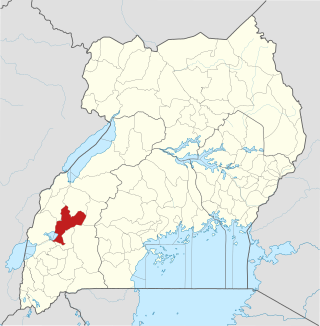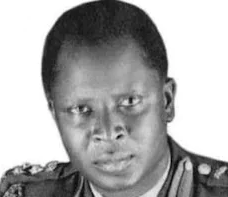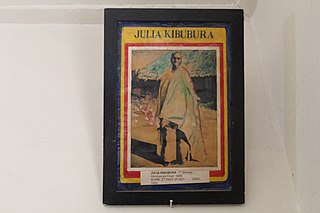
The Protectorate of Uganda was a protectorate of the British Empire from 1894 to 1962. In 1893 the Imperial British East Africa Company transferred its administration rights of territory consisting mainly of the Kingdom of Buganda to the British government.

Ankole was a traditional Bantu kingdom in Uganda and lasted from the 15th century until 1967. The kingdom was located in south-western Uganda, east of Lake Edward.

Kamwenge District is a district in Western Uganda. It is named after its 'chief town', Kamwenge, where the district headquarters are located. Kamwenge District is part of the Kingdom of Toro, one of the ancient traditional monarchies in Uganda. The kingdom is coterminous with Toro sub-region. The districts that constitute the sub-region are: (a) Bunyangabu District (b) Kabarole District (c) Kamwenge District (d) Kyegegwa District (e) Kitagwenda District and (f) Kyenjojo District.

Busoga is a kingdom and one of four constitutional monarchies in present-day Uganda. The kingdom is a cultural institution which promotes popular participation and unity among the people of the region through development programs to improve their standard of living.

The Church of Uganda is a member province of the Anglican Communion. Currently there are 37 dioceses which make up the Church of Uganda, each headed by a bishop.
Ibanda is a town in the Western Region of Uganda. It is the main political, administrative, and commercial centre of Ibanda District and the site of the district headquarters. It started wayback in 1990s and was elevated from a trading centre to a town board, town council and in 2016 it was granted a Municipality status. The Municipal Council has three Divisions of Kagongo, Bisheshe and Bufunda with 21 wards of Kyaruhanga, Bufunda, Nyamirima, Nsasi, Kayenje, Kashangura, Rwenshuri, Kigarama, Rugazi, Rwobuzizi, Kakatsi, Bugarama, Karangara, Kabaare, Kanyansheko, Nyakatookye, Kyeikucu, Kikoni, Kagongo, Ruyonza and Katongore ward. Ibanda Municipal Council has over 230 villages. Ibanda Municipal council commenced its operations on 1 July 2016 after being elevated from a Town Council and other sub counties that were annexed to..
Mbarara Regional Referral Hospital, commonly known as Mbarara Hospital, is a hospital in Mbarara in the Western Region of Uganda. It is the referral hospital for the region and specifically for the districts of Mbarara, Bushenyi, Ntungamo, Kiruhura, Ibanda, and Isingiro. The hospital serves as the teaching hospital for the Mbarara University of Science and Technology.
Signed in March 1900, this agreement formed the basis of British relations with Buganda, the Kabaka (King) was recognised as ruler of Buganda as long he remained faithful to her Majesty, the Lukiko given statutory recognition. This was following another agreement signed in 1894 in which the Kingdom of Buganda, then known as Uganda, was declared a British Protectorate.This agreement is also known as the Buganda Charter of Rights and was upheld for more than 50 years.

Rubirizi District is a district in Western Uganda. Like most Ugandan districts, the district is named after its 'chief town', Rubirizi, where the district headquarters are located.

Buhweju District is a district in Western Uganda. It is one of the districts that constitute the Ankole sub-region. Its 'chief town', is Nsiika.

Mitooma District is a district in Western Uganda. It is named after its main municipal, administrative and commercial center, Mitooma.
The Uganda Legislative Council (LEGCO) was the predecessor of the Parliament of Uganda, prior to Uganda's independence from the United Kingdom. LEGCO was small to start with and all its members were Europeans. Its legislative powers were limited, since all important decisions came from the British Government in Whitehall.
The Nyakahita–Kazo–Kamwenge–Fort Portal Road is a road in the Western Region of Uganda, connecting the towns of Nyakahita and Kazo in Kiruhura District, Ibanda in Ibanda District, Kamwenge in Kamwenge District, and Fort Portal in Kabarole District.
Professor Emmanuel Karooro is a Ugandan educator, academic and academic administrator, who serves as the Vice-Chancellor at Ibanda University, a private co-educational institution of higher learning in the Western Region of Uganda.

Basil Kiiza Bataringaya was a prominent Ugandan politician in post-independence Uganda. He was the Leader of the Opposition at the beginning of the Apollo Milton Obote government, and then he changed parties and was appointed to the powerful role of Ugandan Minister of Internal Affairs. He was imprisoned, tortured, and was one of the first political prisoners to be executed by the Idi Amin regime.

Grace Stuart Katebariirwe Ibingira was a Ugandan lawyer and politician.
The Anglican dioceses of Ankole and Kigezi are the Anglican presence in (roughly) the ancient Ankole kingdom and the old Kigezi District; they are part of the Church of Uganda. The remaining dioceses of the church are in the areas of Buganda, of Eastern Uganda, of Northern Uganda, and of Rwenzori.

Ali Fadhul was a Ugandan military officer and convicted criminal who served as governor, minister and army chief of staff during the dictatorship of President Idi Amin. In course of his career, he also commanded the Simba Battalion of the Uganda Army (UA). He was one of Amin's last loyal followers during the Uganda–Tanzania War of 1978–1979. Following the conflict, Fadhul was arrested by the new Ugandan government, and convicted of murder. Sentenced to death, he spent 22 years in prison until he was pardoned by President Yoweri Museveni in 2009.

George Wilson CB also known as bwana tayari - "Mr. Ready", amongst natives in East Africa, was a general African staff employee of the Imperial British East African company (1890–1891). He served as Chief Lieutenant to then-Captain Sir Frederick D. Lugard from 1889 to 1890, and was second in command during Lugard's caravan expedition to Uganda on 6 August 1890. The Europeans were Fenwick De Winton, William Grant, and Archibald Brown. George Joined the Uganda Service/government in 1894 and was in civil charge of the Protectorate during the outbreak of the Sudanese mutiny. He was appointed first class transport officer then the 1st class assistant of the Uganda protectorate on 30 August 1894. Was the sub-commissioner of the Buganda Kingdom in 1895. Also Was Her Britannic Majesty's acting commissioner and the commander in chief of the Uganda Protectorate and the consul-general. Was awarded the C.B. on 2 January 1899. He was the first ever Chief collector for the Bunyoro district. He was tasked with drawing up the 1901 Ankole agreement and presenting it to the Ankole chiefs and the Ankole people before it was signed in August of that year with the blessing of Ankole and the British government with Wilson as its Chief negotiator and representative. Mr. Wilson was then the deputy commissioner of the Uganda Protectorate at Entebbe, government house and deputy governor of the protectorate. He was H.M. – His Majesty's commander in chief and acting commissioner of the Uganda protectorate (1904–1906) and. Was a fellow at the Royal Society of Arts and a silver medal recipient since 28 June 1907.

Julia Kibubura was the first woman to take up a political leadership position as Gombolola (County) chief in Western Uganda. The locals addressed her as Omwami which is translated as Sir in English. She was appointed as a Gombolola chief by Harry St. George Galt who was a sub commissioner in charge of the western region in 1905. In honor of her memory, Kibubura Girls' Secondary school was named after her because she was an advocate for mass education, especially for girls. She was a former diviner of the King of Ankole.













